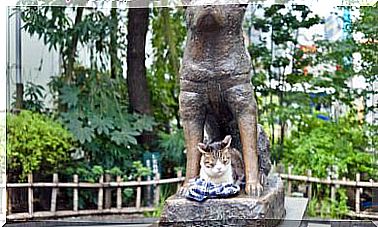The Most Common Causes Of Pneumonia In Pets

Maybe you recently went to the vet with your pet because of breathing difficulties. In general, these situations resolve relatively easily, since the pathological processes involved are usually not serious. Cough or tracheitis are the most common respiratory diseases. However, in some cases the situation can worsen and lead to the development of pneumonia.
Since there can be many different causes of pneumonia in pets, in today’s article we want to show you the most common triggers.
What is pneumonia?
Pneumonia is understood to mean all clinical processes that cause inflammation of the lung tissue. If the bronchial tissue is also swollen, it is called bronchopneumonia.
Distinguishing between pneumonia and bronchopneumonia is complicated and unnecessary. In this disease, the entire lung parenchyma and bronchial tissue are often undifferentiated.
The causes of pneumonia in pets
The causes of pneumonia in pets are many. Therefore, we want to concentrate below on the most important and most common triggers that can lead to the development of pneumonia.
Bacterial pneumonia
Bacterial pneumonia is an inflammatory response of the body to the growth of virulent and pathogenic bacteria in the lung parenchyma.
These bacteria enter the upper airways through respiration or aspiration. In addition, hematogenous entry – through the bloodstream – is possible, albeit much less frequently.
Aspiration pneumonia deserves special mention in this context. This often occurs as a result of the aspiration of vomit and regurgitated matter in unconscious animals. To prevent this complication, it is crucial to position the animals with their upper backs slightly elevated. This will prevent them from aspirating regurgitated fluids.
Once the microorganisms have established themselves, a number of factors must come together for an infection to develop. This is because, in many cases, the body’s defenses can fight the bacteria that have colonized the area.
The most common pathogens that cause bacterial pneumonia in pets are as follows:
- Bordetella bronchiseptica
- Streptococcus zooepidemicus
- Escherichia coli

Allergic pneumonia
This type of pneumonia is inflammation of the lung parenchyma in response to certain antigens.
Most often these penetrate the airways through breathing (respiration). They can also enter the body through the bloodstream.
As you probably know, allergies are nothing more than an exaggerated immune response to a substance that the immune system considers dangerous. Therefore, the organism identifies this allergen as a threat when it gets into the lungs. As a result, there is a reaction to eliminate this substance from the body at all costs.
The most common causative agents of allergic pneumonia are:
- Vegetable spores
- Fungal hyphae
- Insect antigens such as mites
- Parasite antigens
Fungal pneumonia
This is an inflammation of the lung tissue caused by a reaction to a fungal infection. By inhaling spores that are on the ground, they get into the airways.
When animals sniff on the ground, they can inhale such pathogenic spores, which then settle in the lung parenchyma and continue to multiply. As soon as they are in the body, the mushrooms find a perfect environment for their growth due to the temperature and humidity there. Because of their habits, dogs are more likely to suffer from this type of pneumonia than cats.
The most common fungi that lead to the development of fungal pneumonia in pets are the following:
- Blastomyces dermatitidis
- Histoplasma capsulatum
- Coccidioides immitis
- Cryptococcus neoformas

Final thoughts
While the body’s defenses are able to fight most of the pathogens that can cause pneumonia in pets, there is still some risk. It is therefore of fundamental importance for the prognosis and development of this disease to recognize it at an early stage.
So if you notice even the slightest symptom of a respiratory illness such as frequent coughing, sneezing, or phlegm, you should contact a veterinarian immediately.









